Despite its disastrous ending, Harsha Walia is choosing to focus on the positive parts of her tenure at the BC Civil Liberties Association.
“It wouldn’t be fair to recount whatever my personal feelings are,” she told The Tyee. She also wants to respect the collective work of her co-workers and community during her 19 months as leader.
Founded in 1962, the BCCLA works to advance human rights and civil liberties through litigation and advocacy. It has thousands of supporters and volunteers across Canada.
When we spoke in mid-September, the long-time activist and author was wrapping up her work as the BCCLA’s executive director and doing belated events for her second book, Border and Rule: Global Migration, Capitalism and the Rise of Racist Nationalism, published earlier this year.
She was reflective, taking time to answer some hard questions. “I’m sorry that I don’t have better answers,” she offered at one point. “It’s hard to make sense of your own life.”
On June 30, following the discoveries of unmarked graves on church and government-run residential school grounds, Walia responded to a news story about two burned Catholic churches with a four-word tweet: “Burn it all down.”
What followed was a social media maelstrom, with some interpreting the tweet as an incitement to violence.
The tweet drew fire from public figures like Ralph Kaisers, president of the Vancouver Police Union and the BC Police Association, and Public Safety Minister Mike Farnworth, who called the tweet “disgusting and reprehensible” and “vile beyond belief.” Tucker Carlson of the American conservative television channel Fox News called Walia a “monster.”
Walia says she’s since received a torrent of racist and misogynist harassment and abuse online, as well as death threats at her home.
She locked her account temporarily and posted two Twitter threads explaining her intention.* She maintains that she wasn’t being literal in the initial post and wasn’t encouraging people to burn down churches.
Rather, it was a criticism of the genocide of Indigenous people through the residential school systems run by the state and churches. “I do think deadly genocidal colonialism, locally and globally, needs to collapse,” she said in a July 3 tweet thread.
Walia noted the first person to draw attention to the tweet also referenced her personal position in favour of abolishing the police. “Then cops, Conservatives, Zionists and right-wing pundits piled on with their scores to settle,” she continued. “This is both personal and also a distraction from staying focused on justice and accountability for survivors.”
In defence of Walia, the Union of BC Indian Chiefs tweeted that it stood with her in “condemning the brutally gruesome genocide of the residential ‘school’ system.”
Walia has said she resigned “on my own terms” in the two weeks that followed the tweet, but that the BCCLA board of directors had created an environment that effectively pushed her out. She said she couldn’t confirm the exact date of her resignation because she doesn’t have “all my emails from my previous work email anymore.”
On July 16, the board announced in a statement it had accepted Walia’s resignation. The same day, the BCCLA’s board president apologized for Walia’s tweet in another statement.
Next, on July 21, three directors resigned in support of Walia, claiming “the process by which the board came to put out Friday’s statements was deeply flawed and driven by external political pressure and threats to the organization’s funding.” The BCCLA is funded largely through member donations and the Law Foundation of BC.
On July 22, a staff member tweeted that B.C. Attorney General David Eby — a former BCCLA executive director — had met with the board president over the incident prior to the two statements. Eby “had a meeting with the Law Foundation on July 14 about Harsha’s tweet. After that, our board swiftly acted to appease the [attorney general],” it said.
A week later, 10 BCCLA staff members released a letter from the official BCCLA Twitter account criticizing the board’s processes and decisions and expressing solidarity with Walia.
“They have been disrespectful, have shown susceptibility to political interference and external pressure and have undermined the leadership and work of our executive director,” the letter said. It was later deleted.
The attorney general’s calendar indicates he did speak to the BCCLA’s board chair, David Fai, in two separate, 15-minute meetings on July 12 and July 14. There was also a July 15 meeting with Josh Paterson, another former BCCLA executive director who is now executive director at the Law Foundation.
Paterson told The Tyee on Oct. 7 that as a former BCCLA executive director, he wasn’t to be involved in any decisions related to the organization for a period of two years. “There was no time at which the government sought to influence any foundation decision about that grantee or any grantee,” he said.
BCCLA board vice-president Haran Aruliah said in an email that the organization would not comment on staff employment matters. Neither he nor board president Fai responded to followup questions by publication time.
In an interview on July 28, Eby told The Tyee: “I did express concerns to the president of the BC Civil Liberties Association about some of her social media comments, and he told me that the association had her resignation in hand and that they had been drafting a statement. He had updated me on that, but it was all in hand before I called him. If she’s suggesting I was involved, I was not.”
In a later statement on Oct. 1 to The Tyee about whether he pressured the BCCLA board, leading to Walia’s resignation, Eby said: “When I met with the BCCLA president in mid-July, I was aware that Ms. Walia had already given written notice of her resignation to the organization. The allegations are completely false. I have tremendous respect for the BCCLA and their independent work.”
Today, nearly three months later, Walia is still in “the processing stage” about what happened.
“I haven’t actually processed it in any way,” she said. “Even when it was all going down, I was still working 90 hours a week, trying to handle all the things.”
But Walia says she’s still proud of the work she did with the organization and hopes the BCCLA’s successes — and its commitment to a new legal ethic — will endure.
She has no idea what comes next.
Walia took time to talk about her just-concluded role, what civil liberties associations are good for, and “the tweet.” This interview has been edited for clarity and length.
The Tyee: You’ve been a long-time community advocate and organizer, especially in the Downtown Eastside. What was it about the BCCLA job that attracted you?
Harsha Walia: I should say it wasn’t an easy decision, I really struggled with it. There were several members on the board who were quite convincing.
I remain interested in places of work, whether they’re paid or unpaid, that tend to multiple issues. Many non-profits only work on single issues. And that’s often for good reason because, of course, you’ll burn out and you need to focus.
One of the things that really interested me about the BCCLA was the wide mandate, the ability and the interest to see different justice issues as connected — to never have to say to a community, “Sorry, that’s outside of our mandate.” I understand that there’s often a practical reality, but also the practical effect is that people are constantly tossed around.
My organizing has always focused on multiple issues and seeing the intersections between them, between capitalism, racism, imperialism, feminism, all of those. I was interested in the possibility of working in a space and in a place that is willing to have, and that does have, a broad justice mandate.
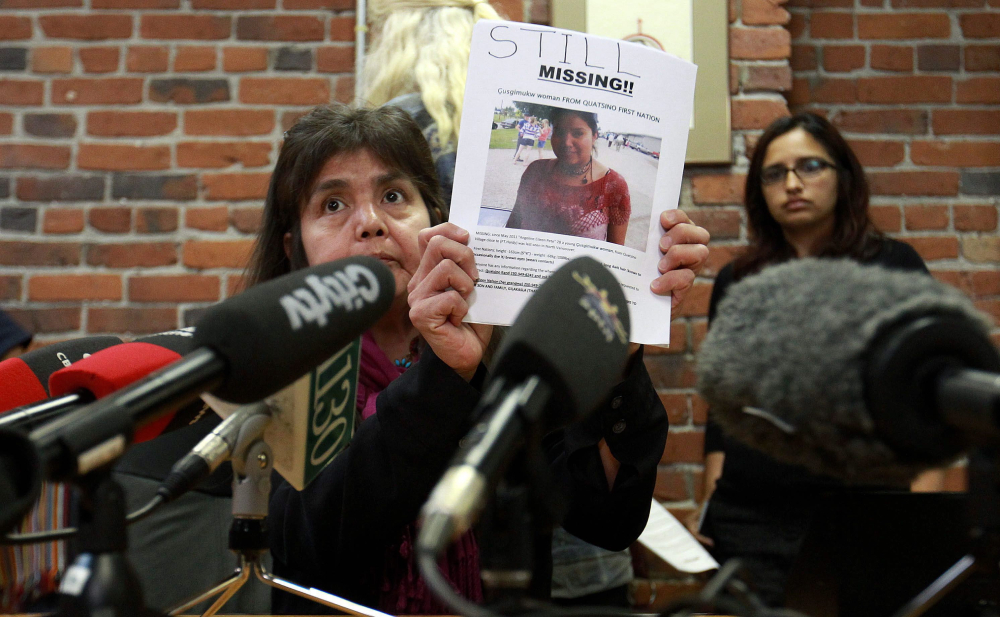
One of the things I do feel quite proud of, in my time at the BCCLA and of the association as a whole, is having taken a strong position in support of Palestine. And that involves many things. That involves a principled position that opposes the International Holocaust Remembrance Alliance’s definition of anti-Semitism, which basically criminalizes those who speak in support of Palestinian human rights. It involved taking a position and being involved in a lawsuit and a legal complaint against Justice David Spiro and what’s been happening at the University of Toronto and the meddling in the [University of Toronto’s] human rights law program. And then also publicly expressing support for the rights of Palestinian people during the bombing of Gaza earlier this year.
A lot of legal organizations stay away from speaking out in support of Palestine because they’re concerned about backlash, because it takes a lot to be critical of Israel. And oftentimes they justify it as being outside of their scope. That the BCCLA spoke out, for example, is something I was quite excited by.
Do you still feel that sense of hope that you had going in about what the BCCLA can do?
It’s a mixed bag. I think the BCCLA, like most organizations and particularly legal organizations, has to weigh what it says publicly with what it thinks is palatable to its supporters, to its funders, and particularly to the world of lawyers. And to the vocabulary and the grammar of the legal profession, which is imbued as any profession is with the same kinds of hierarchy and oppression. And then there’s also a particular kind of professional elitism that the legal world carries and is criticized for.
Leaving aside the recent terrible actions [including] the statement of the board, 10 staff of the BCCLA released a tweet — that got removed — that expressed their commitment to continue the same ethics and politics. Time will tell, but I’m hopeful that group of staff, if they remain there, are committed.
What other files do you feel good about in your time at the BCCLA?
One is just generally trying to bring the BCCLA to community. Rather than a particular file, more of an orientation and an ethic of being in service to frontline communities, whether it’s in service to the Wet’suwet’en early last year, or in service to Indigenous communities and people who use drugs, and the Downtown Eastside community.
In terms of other major files, probably policing. The BCCLA has worked on policing for 60 years. It was founded around policing issues as civil liberties issues and human rights issues. To deepen the association’s work on policing, and to really have the association think about which kinds of reforms the association previously advocated for and whether those have actually been successful or not. Not just to think about what we can win, but what is actually useful and effective. And again, keeping in mind communities.
I think of the work of shifting from just calling for an investigation into street checks, to actually calling for a ban on street checks. From shifting from certain kinds of reforms, to actually questioning the world of policing, particularly as it relates to systemic racism, anti-Black and anti-Indigenous racism and violence.
To have the BCCLA, which has a seat at many policing tables, shift from only thinking about law reform from the perspective of what’s achievable, to actually what is just, and what are the actual needs of community... I feel good about that, because I think that’s really what all work should be oriented towards. Not just what’s winnable, but what’s actually needed.
With this shift, from what’s achievable to what is just, the dust-up at the end of your tenure probably wasn’t your only challenge. What other challenges did you face in the job?
I’d have to say the fact that I was hired signals an appetite to consider those shifts. I don’t think I was entirely forcing something that the association wasn’t ready for, particularly when it comes to a majority of the staff team, who I think were keen on and have those principles themselves, on looking at how we can make this work relevant to people, not just for the sake of arguing in the court.
It wasn’t as much a challenge as it was reminders that we don’t make legal arguments for the sake of legal arguments; we make them so that they’re in line with and in service to what the communities we work alongside want, and to always put those concerns first and foremost, rather than putting the law first and foremost.
There was an outcry over the unmarked graves of children being found across Canada. But the only person who ended up without a job and faced any real consequence was the head of a civil liberties organization. What do you make of that?
Even leaving aside the question of my job, which has become so embedded in this, the part that is also deeply troubling is the amount of hate and violence that I faced for the first several weeks. A lot of it was trolls, but there were also some serious death threats. I got death threats at my home. No one wants to [be attacked] on Tucker Carlson — that just involves a whole other layer of violence that you’re then subjected to.
There’s a systemic reality of racialized, gendered violence that impacts racialized women in online spaces. It’s horrendous. And for me, that’s also part of this. Who gets trolled, who gets death threats and for what, is highly concerning.
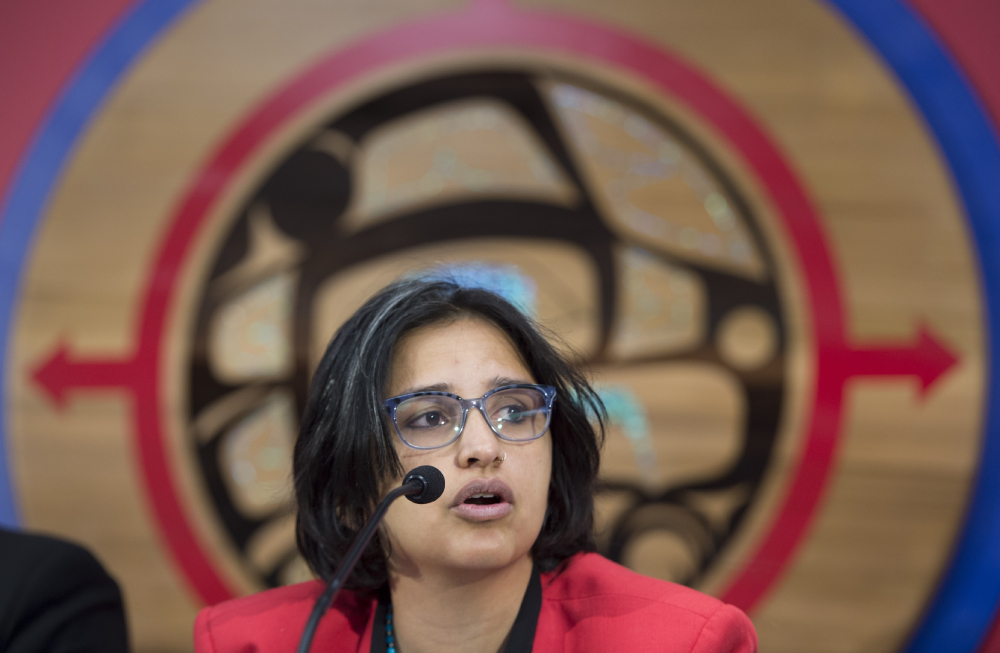
It really affected me and affected the safety of my household in very tangible ways. It affects not just my security and safety; it affected my well-being for a very long time. I’ve been through this wringer before, but it doesn’t ever make it easier. And it’s a horrible price to have to pay to be a vocal, radical, racialized woman in radical organizing. And knowing that is something you will be subjected to, and that you make that sacrifice, is not really a choice anyone should have to make. It’s the devil’s choice.
The other thing I think is also incredibly troubling, but I don’t think got as much notice, is that the first person to kind of pick up and run with this tweet, or the first two people, were police officers.
People talk about the police lobby in the U.S. context, and the strength of policing power to quash dissent, but not in the Canadian context. And to me, it’s very jarring that a number of police officers and the head of the police association, that all of these people are tweeting about me explicitly, also naming that I’m someone who has spoken out against police, and that that is ultimately really their motive. They’re going after me, and it’s not a flag for anybody. I find that deeply concerning.
As I’ve mentioned, the BCCLA took strong positions that were critical of Zionism and of Israel and in support of Palestinian human rights. And that meant this tweet was weaponized by a number of people who are politically opposed to the work I was doing, including Zionists. And that concerns me, because this isn’t only about me, this is the way in which dissent is suppressed. This is the way in which dissent is smeared.
It’s surprising to me that the various external pressures that have been named, for example, by prior board members in resigning, that were named in the staff tweet, that none of that has really been investigated or followed up on. And it also involves members of the provincial government. So that I think is important, because it can happen to someone again.
You’re saying it’s both true that you were effectively pushed out, but you also managed to resign on your own terms?
Yeah, I resigned on my own terms. And then, as things proceeded, the board created an environment that effectively pushed me out, including making the statement that they did, apologizing for my tweet. And the UBCIC, for example, was one of many organizations that responded to really criticize and condemn the board for their statement.
There were, without actually going into any details, comments that were made about my hiring, and just things that showed disrespect to me, to my role and my work that I had done that effectively pushed me out. That, had I not left on my own terms, would have made it really impossible to have stayed anyway.
One of the main civil liberties is freedom of expression, especially, against its abridgement by the powerful. It’s interesting that a civil liberties association, where the job is literally about challenging that abridgement, wouldn’t have more protection and safeguards against that pressure from powerful people.
Absolutely. Isn’t that the contradiction? I find how everything went down troubling not only for myself but really as a window to how power is configured, both at the level of a board and in the way that power circulates externally, whether it’s political power or right-wing power, police power, etc.
And that’s the irony of why an organization like BCCLA is needed. Free expression really needs to be real. Free expression as a fight actually came from the struggle of the left, historically. That is why defending free expression is core to human rights, and globally, of course.
At the same time, speech is so unequally distributed. Access to speech is so fundamentally marked by hierarchical divisions in society, and the people who are decrying “cancel culture” are the first to cancel people on the left, and here I mean the right-wing in particular.
Do you have any regrets about how everything went down?
I do. I have regrets. At the same time, I have to remind myself, as my comrades and friends would remind me, that I have to hold whatever regret I may have with the bigger reality, which is that systems of power and white supremacy and the right are ultimately responsible for having had this turn out the way that it did. The outrage was manufactured. And it could have been over anything.
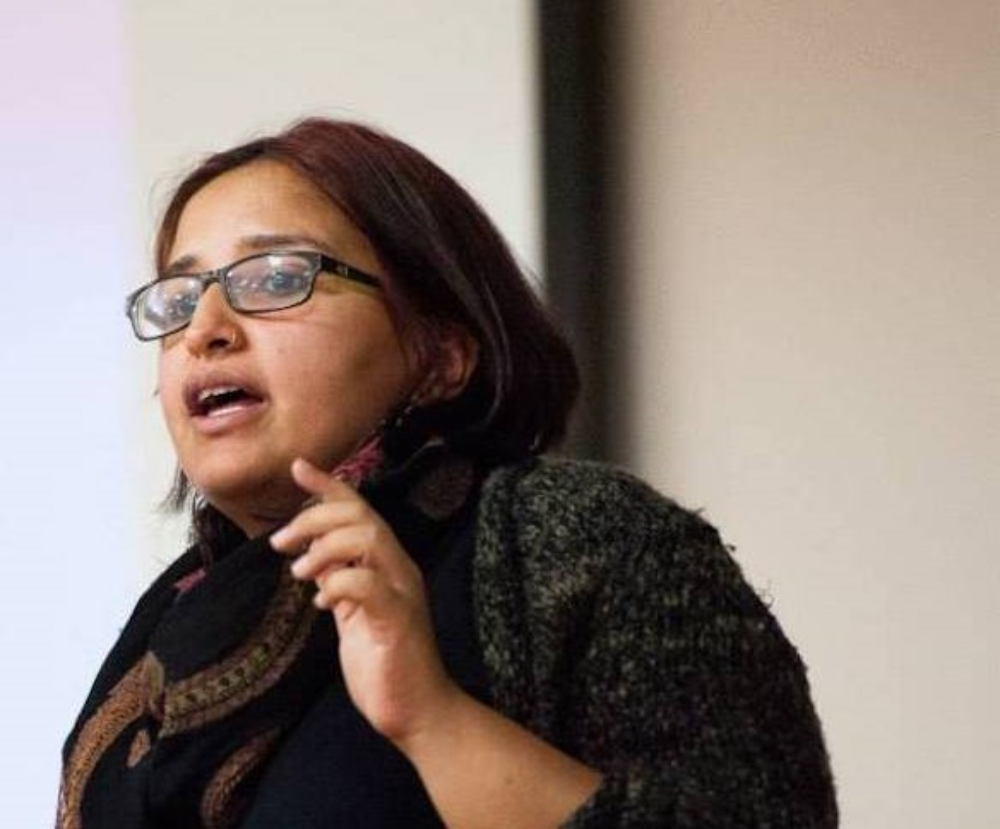
And that’s why I come back to these undercurrents of policing power, or the powers that are invested in backing the state of Israel. It could have been anything. They’ve been coming after me and others for a very long time. I think regardless of my personal feelings or regrets, I’m really interested and invested in movements getting stronger in fighting these moments and understanding them for what they are. And really pushing back against the criminalization or the suppression or smear tactics when they affect human rights defenders.
There’s an op-ed from some of your defenders in The Tyee that characterized the outrage you faced as “pearl clutching” and as the status quo refusing to change and defending itself. I wondered what you thought of that defence, and if that aligns with how you think about it?
It absolutely aligns with how I think. I think it was manufactured outrage. I think it was pearl clutching. And Grand Chief Stewart Phillip, who was one of the co-authors of that op-ed, in a conversation told me that the genocide deniers are looking for anything to deny the reality of genocide. So now, instead of actually reckoning with genocide, they’re finding reasons to distract and deny from it.
I had mentioned like, “Oh, all of this is distracting from the reality of genocide.” And he reminded me that it wasn’t my tweet that was distracting. It was the response to it that was distracting. And I agree. People who chose to respond to it in the ways that they chose to respond to it, they’re the ones who are making it out to be something rather than focusing on the actual context, which is genocide.
What do you think about the people who criticize your words or say you should have chosen different words or been less inflammatory?
I think people have a right to their opinion. Not everyone has to agree with my choice of words. I can understand and respect that. And again, it depends on who’s saying it and for what reason. If they’re saying it in good faith, I accept it. If they’re saying it because they’re one of the genocide deniers, then I don’t think it is a good thing.
What do you think a good-faith criticism of your tweet and what you’re saying would have been?
Good-faith criticism would be like, “Did you literally mean that every church around the world should be burned down? What about people who are people of faith, who literally think that you mean that churches should be burned down?” You know, things like that.
I’ll give you an example. I had a priest write me... I took their concerns as good faith. He was like, “I’m a priest. I’m engaged in the work of reconciliation.” I mean, only he knows if he is or isn’t. And he identified as a racialized pastor, a Christian who had immigrated from another country. I understand the nuances of that. And he told me that he’d heard about the comments on the news, and he hadn’t even read Twitter or anything. And he said, “I’d like to know if how it is being conveyed is accurate.” And I sent him my first tweet thread responding to the whole “controversy,” and he wrote back and said, “Thank you so much, I wish you well in your work.”
So those are the kinds of things that I mean, where people are genuinely inquisitive and they’re just reading the news story, how it’s conveyed, and are wondering what’s happening. That’s what I mean by good-faith criticism, or maybe even good-faith inquiry.
If there’s anything positive that could come out of this moment, what would you like it to be?
It’s hard, because I’m looking for something positive on top of the shit I’ve been through myself, it’s hard to abstract myself from it.
But if someone is going to learn a lesson on the backs of this shit that I went through, I will squarely say for leftist organizers, in whatever capacity that they’re organizing or working, to really be attentive to the ways in which power circulates and will try to come for them. And to know that that is a reality.
And to try to see through it, because, of course, it won’t always look straightforward. It won’t always look as straightforward as overt criminalization. We know that 99 per cent of ways in which attempts are made to weaken the left are through manufactured smear campaigns. I think we have to be able to discern those.
And that’s not always easy. Because sometimes there is good-faith critique and then sometimes there’s manufactured outrage. I think we need to take the time to hone the skills of knowing what’s what and doing that collectively.
With files from Andrew MacLeod
*Story updated on Oct. 12 at 8:30 a.m. to correct that Harsha Walia’s original tweet was not deleted and that she locked her account temporarily. ![]()
Read more: Rights + Justice, BC Politics


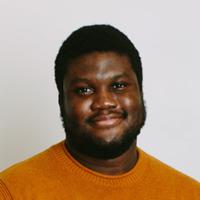
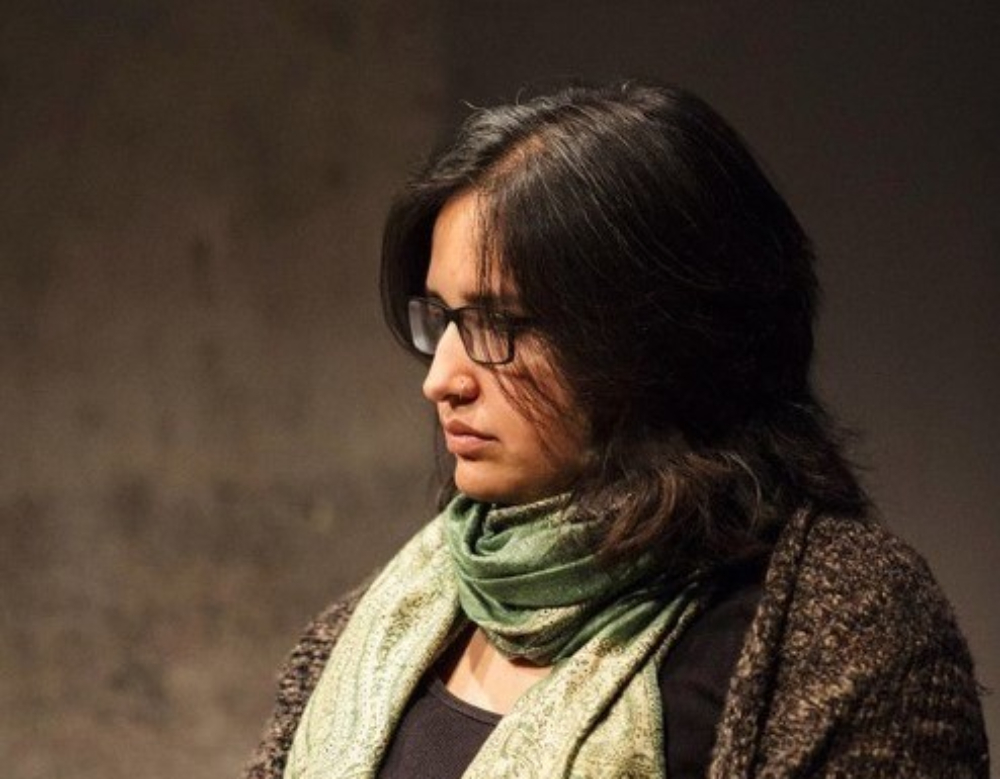












Tyee Commenting Guidelines
Comments that violate guidelines risk being deleted, and violations may result in a temporary or permanent user ban. Maintain the spirit of good conversation to stay in the discussion.
*Please note The Tyee is not a forum for spreading misinformation about COVID-19, denying its existence or minimizing its risk to public health.
Do:
Do not: